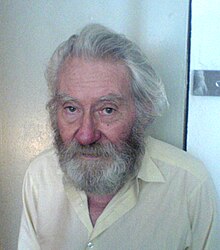Otto Piene
| Otto Piene | |
|---|---|

Otto Piene in 2007
|
|
| Born |
18 April 1928 Bad Laasphe, Province of Westphalia |
| Died | 17 July 2014 (aged 86) Berlin, Germany |
| Nationality | German |
| Known for | kinetic art, Performance art |
| Movement | Zero (art) |
| Awards | Leonardo da Vinci World Award of Arts (2003) |
Otto Piene (18 April 1928 – 17 July 2014) was a German artist specializing in kinetic and technology-based art. He lived and worked in Düsseldorf; Cambridge, Massachusetts; and Groton, Massachusetts.
Otto Piene was born in 1928 in Bad Laasphe and was raised in Lübbecke. Between 1949 and 1953 he studied painting and art education at the Academy of Art in Munich and the Kunstakademie Düsseldorf. He was lecturer at the Fashion Institute in Düsseldorf. From 1952 to 1957 he studied philosophy at the University of Cologne.
He was a Visiting Professor at the University of Pennsylvania beginning in 1964. From 1968 to 1971, he was the first Fellow of the MIT Center for Advanced Visual Studies (CAVS), founded by György Kepes. In 1972, he became a Professor of Environmental Art at MIT. In 1974 he succeeded Kepes as director of the CAVS, in which position he served until September 1, 1993.
Piene and Heinz Mack founded the group ZERO in 1957. This group consisted of artists who wanted to redefine art after World War II. By the 1960s they were internationally known, especially in Japan, Americas, and throughout Europe. Members of the group included Piero Manzoni, Yves Klein, Jean Tinguely, and Lucio Fontana. Piene and Mack also published ZERO Magazine from 1957 to 1967.
With Günther Uecker, Heinz Mack and Mattijs Visser he founded in 2008 the international ZERO foundation. The foundation has the ZERO archives from the three Düsseldorfer artists as well as documents and photos from other related artists.
...
Wikipedia
